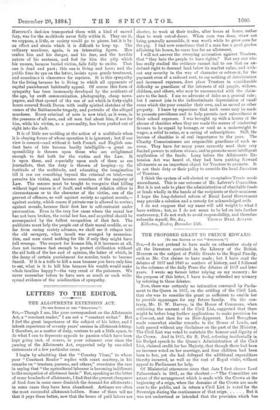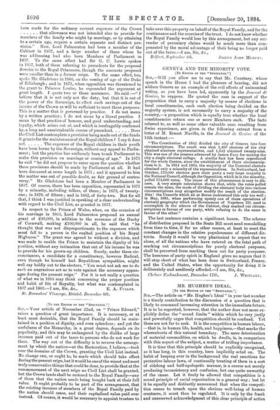THE PROPOSED GRANT TO PRINCE EDWARD.
[TO THE EDITOR OF THE "SPECTATOR,"]
Sin,—I do not pretend to have made an exhaustive study of all the literature contained in the Library of the British Museum on the subject of Public Grants to the Royal Family, such as Mr. Cox claims to have made ; but I have read the debates of 1837 and 1840 as matters of history, and I followed hi the columns of the daily Press the debates of 1857 and later years. I wrote my former letter relying on my memory ; for the purpose of this letter, I have to-day refreshed my memory by referring to those debates.
Now, there was certainly no intimation conveyed by Parlia- ment to the Queen in 1837, on the settling of the Civil List, that she was to consider the grant as sufficient to enable her to provide appanages for any future family. On the con- trary, Mr. D. W. Harvey, in the House of Commons, when criticising the amount of the Civil List, suggested that there might be before long further applications to make provision for a Consort, and then for an Heir-Apparent. Lord Brougham made somewhat similar remarks in the House of Lords, and both passed without any disclaimer on the part of the Ministry. The Civil List was voted to maintain the honour and dignity of the Crown. And in 1845, Sir R. Peel, referring incidentally in his Budget speech to the Queen's Administration of the Civil List, claimed credit for her Majesty, that though there had been no increase voted on her marriage, and four children had been born to her, yet she had defrayed the additional expenditure thereby incurred, as well as the cost of Royal visits, without appeal to Parliament for help.
Of Ministerial utterances since that date I first choose Lord Palmerston's in 1861, as the shortest :—" The Committee are aware of the arrangement which is made with the Crown at the beginning of a reign, when the domains of the Crown are made over to the public, and in return a Civil List is voted for the
Sovereign during the continuance of that reign But it was not understood or intended that the provision which has
been made for the ordinary current expenses of the Crown
that allowance was not intended also to provide for members of the family who might by marriage, or by attaining to a certain age, require a certain separate and distinct pro- vision." Now. Lord Palmerston had been a member of the Cabinet in 1837, and a large number of those whom he was addressing had also been Members of Parliament in 1837. To the same effect had Sir G. C. Lewis spoken in 1857, both of them referring to precedents for the proposed dowries to the Royal Princesses, though the amounts proposed were smaller than in a former reign. To the same effect, too, spoke Mr. Gladstone in 1866, on the coming of age of the Duke of Edinburgh; and in 1871, when opposition was threatened to the grant to Princess Louise, he expounded the argument at great length. I quote two or three sentences. He said :—" I believe that it is not only not the duty, but that it is out of the power of the Sovereign, to effect such savings out of the income of the Crown as will be sufficient to meet these purposes. This is a matter that is governed by practice. I do not mean by a written practice ; I do not mean by a literal practice. I mean by that practice of honour, and good understanding, and loyalty, which arises out of, and which is irrefragably confirmed
by, a long and unmistakeable course of precedent Does the Civil List contemplate a provision being made out of the funds it grants for the maintenance of the Royal children P I say it does not The expenses of the Royal children in their youth have been borne by the Sovereign, without any appeal to Parlia- ment; but the practice has uniformly been to ask Parliament to make this provision on marriage or coming of age." In 1873 he said "he did not propose to enter upon the question whether these provisions should be made by Parliament at all. It had been discussed at some length in 1871; and it appeared to him the matter was out of possible doubt, as fair ground of contro- versy." Mr. Gladstone had been a Member of Parliament in 1837. Of course, there has been opposition, represented in 1871 by a minority, including tellers, of three ; in 1873, of twenty- one; in 1878, of fifteen ; and in 1882, of forty-two. But for all that, I think I was justified in speaking of a clear understanding with regard to the Civil List, as granted in 1837.
In respect to the Prince of Wales, when, on the occasion of his marriage in 1863, Lord Palmerston proposed an annual grant of 240,000, in addition to the revenues of the Duchy of Cornwall, making 2100,000 in all, he said that "he. thought that was not disproportionate to the expenses which must fall to a person in the exalted position of his Royal Highness." The grant was agreed to without a division, and was made to enable the Prince to maintain the dignity of his position, without any intimation that out of his income he was to provide for his grown-up children. Surely, under these cir- cumstances, a candidate for a constituency, however Radical, even though he himself had Republican sympathies, might well say boldly out to the electors, "You must not ask me to do such an ungracious act as to vote against the necessary appan- ages during the present reign." For it is not really a question of what we in 1884 may think concerning the proper position and habit of life of Royalty, but what was contemplated in







































 Previous page
Previous page